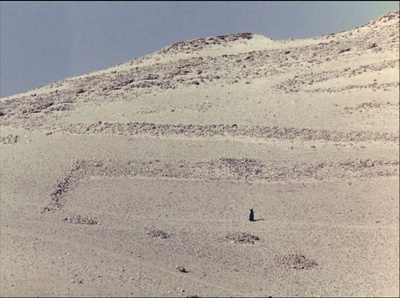
Videograms of Resistance x Heirloom x Before Forgetting
The past is no longer, since it is arbitraly retold, portrayed, preserved and violently destroyed by those who are rewriting history to remain in power.
The material history of Palestine and its documentation are being built and rebuilt on shaky foundations, especially with the ongoing genocide, that is tightly connected to a scholasticide, hence an eradication of everything that is connected to Palestinian memory, episteme, identity and selfhood.
All three films that will be projected speak to fragmented histories and an archival dissonance - equally the three pieces can be understood as a an archive of resistance, that seeks to preserve, reshape, create and amplify the untold and forgotten stories of those who have been resisting and those who are still actively resisting.
The film evening will shed light and discover in different ways that the material, intellectual and spiritual losses have a deep inpact on collective memory and cultural preservation in Palestine. The following films will be screened: Palestine in the Eye (1976) by Mustafa Abu Ali, UNDR (2024) by Kamal Aljafari and News Time (2001) by Azza El-Hassan.
The event takes place at HEIRLOOM, Sølvgade 36, st.tv., Copenhagen.
All are welcome. Entrance is for free. Fresh mint tea, coffee, snacks and soup will be served.
Programme:
Palestine in the Eye
Mustafa Abu Ali | Palestine | 1976 | 28 min
“Utilising motion and still images, we can deliver the revolution’s concepts to the masses, thus maintaining its continuity.” Hani Jawharieh
Mustafa Abu Ali’s film pays tribute to the Palestinian freedom fighter and cinematographer Hani Jawharieh. Co-founder of the Palestinian Film Unit (today Palestinian Film Institute), Jawharieh’s work was seminal in representing the Palestinian perspective against Israeli occupation and Western imperialism in the Arab World. His dedication to the Palestinian fight for liberation led him to the frontline, where he recorded the fedayeen, converging armed struggle with the cinema of resistance. Jawharieh was martyred by a missile attack in Aintoura, Lebanon while filming combat. His work paved the path for Palestinian self-representation and the forming of a visual narrative liberated from the West’s gaze. However, much of Hani’s work was looted by the Israeli Army during its 1982 invasion of Beirut in an attempt to erase the cultural and archival heritage of Palestinians, a practice systematically enacted by the settler-colonial forces.
Palestine in the Eye is part of the 'The Void Project’, which was founded by filmmaker Azza El-Hassan in 2018. The project explores the ‘presence and absence of visual archives as a discourse in wartime narrative formation’. A broad collection of films produced by the Palestinian Film Institute during the 60s, 70s, and 80s have been restored and redistributed since then, with upcoming films currently in production.
UNDR
Kamal Aljafari | Germany | 2024 | 15 min
The camera’s eye returns obsessively to the same places, a vertical perspective that imposes control, the possession of archaeological sites and stones which lie waiting for thousands of years in the desert. The places it observes, however, are not deserted: we see, as if glimpsed from afar, the peasants working the land, themselves transformed into landscape. Something disturbs the stillness of the place: explosions on land and in the sea prepare the ground for new cities with new names, new structures, new forests. This landscape is transformed into a scenography of appropriation.
News Time
Azza El-Hassan | Palestine | 2001 | 52 min
It is ‘news time’, not ‘film time’ - this is how documentary filmmaker Azza El-Hassan explains the fact that she failed to find anyone willing to make a film with her. All the crewmembers are busy reporting the situation in Ramallah, which is deteriorating daily since the intifada. So she points her camera at the ghost town with its deserted streets, which challenge her to extract some beauty from them. Someone like her landlord, who declares his love to his giggling wife, whom he has known for twenty-five years. But they, too, leave the town when the war planes fly over, leaving El-Hassan with four boys who are the only ones who have not yet abandoned their neighbourhood. They talk about the daily threats they have to cope with, the stones they throw and the fears they have to suppress.
Location
HEIRLOOMSølvgade 36, st.tv.
1307 København